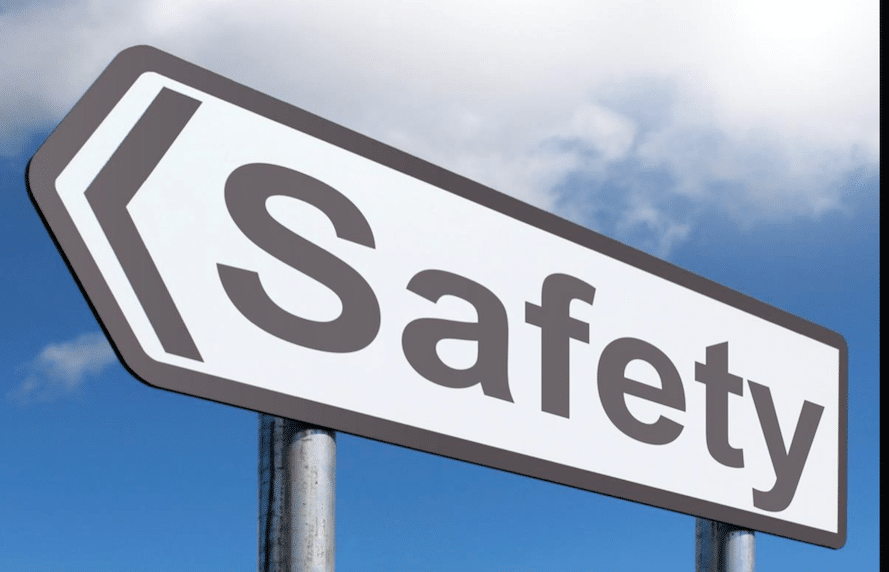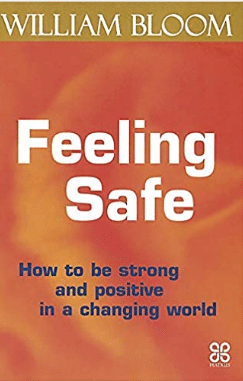
A lot of people aren’t feeling safe these days.
- Three million people in the US keep open-carry weapons with them at all times.
- Self-proclaimed-militias stalk US State houses.
- The global home security industry is expected to reach $78.9 billion by 2025.
- Between February and mid-March 2020, the use of anti-anxiety meds spiked 34%.
When chaos reigns, safety can feel elusive. Unfortunately, feeling unsafe makes us less safe.
When people don’t feel safe, instead of thinking and acting clearly in response to actual dangers, their thoughts mire in a hormone-crazed web of reactivity.
Paradoxically, when you feel safe within yourself you respond to danger more effectively.
Like martial artists who master the art of fighting while feeling safe and calm.
When we lack an inner sense of safety, all the external security measures we buy are not likely to calm us.
Feeling Safe
 In 2002, English author William Bloom wrote Feeling Safe: How to Be Strong and Positive in a Changing World.
In 2002, English author William Bloom wrote Feeling Safe: How to Be Strong and Positive in a Changing World.
Writing in the wake of the attacks of 9-11, he explored how people could regain their sense of inner safety. The book is exceedingly relevant to our chaotic times.
I never used to give safety much thought. When I studied Abraham Maslow’s famous Hierarchy of Needs, safety was listed above being able to eat and poop. Critical, but not very sexy. I preferred to learn about “Self-actualization” at the top of his pyramid.
I underrated safety. Now, I need to create it for myself instead of waiting for the world to change.
I’d like to think that we’ll be safer when the US has a new President or a COVID vaccine.
Although both events will be great, they won’t insure our feeling safe.
We don’t need to wait for the world outside of us to change. We can start to change our inner state to find the safety we need.
William Bloom made many great points. Here’s what I picked up on:
-
Don’t judge yourself for not feeling safe.
The science of epigenetics suggests that a genetic residue of ancestral trauma lives within many of us. Such trauma may trigger deep feelings about a situation that might seem non-threatening to others. Friends who are the grandchildren of Holocaust survivors speak about how they carry primal feelings of being at risk. A good friend jokes that she’s always making sure she has food, even though she has never gone hungry. It’s as if a piece of her remembers, on a gut level, what happened to her Jewish ancestors almost ninety years ago.
Addressing deep-seated fears and trauma calls for kindness and compassion. It may take time to be able to release such fears.
-
Pay attention to our bodies.
Bloom repeatedly stresses how we need to find safety, not just in our heads, but in our bodies. Stress and fear can kick up a hormonal shit-storm within us. He suggests learning to fortify ourselves with feel-good endorphins, the ones that come from a good laugh or run, to help us rebalance our systems. If he were writing his book today, he would probably talk about the Polyvagal theory and techniques for helping people release trauma and balance their sympathetic nervous system (fight or flight) with their para-sympathetic or calmer side.
If your head is spinning and life does not feel safe, deep breathing is good, followed by getting grounded in your body. Pay attention to what your body is feeling. Just noticing your body can help you calm. It’s difficult for your mind to spin out into the future when you focus on a question like “What is my arm feeling right now?”
-
Get real.
Pay attention to real dangers. Learn about COVID, social injustices, and environmental deterioration. Take appropriate actions and precautions. Survey the horizon, not from a sense of fright, but from an interest in being prepared. Wear the dang mask.
-
Identify which fears are yours.
When we’re swimming in a socio-political soup of anxiety, it’s hard to know which fears are ours and which belong to the collective. (Often, it’s a mix). We start out with a few worries (ours), but after listening to fear echoing through the media, our little spark of fear can morph into a bonfire.

Let’s focus on the fears that are ours, without getting burned by the flames of other people’s fears.
We affect each other with our energies. If I am around a really angry person, I often end up feeling agitated, ill-at-ease, and angry myself, even though I felt fine earlier. Vibes rub off on each other.
Support the kind of energy you want to be surrounded with.
This is another reason, for building up one’s feel-good resources. When I’m projecting calm and happiness, I’m less likely to pick up other people’s anger and hate.
This may mean avoiding situations where you know you can’t stay grounded in yourself. You may need to walk away, kindly, from a political conversation with a favorite relative or turn off the radio when a commentary comes on. Your good energy is precious and you want to build and maintain it, rather than succumb to others’ fears.
-
Connect and do something good for others.
Feeling connected to yourself and others is a key to feeling safe. Helping another can calm our fears.
Admittedly, being physically connected is harder these days. Yet, there are many ways to connect and give.
A connected chorus
Here’s a delightful example from Town Hall Seattle about how a chorus and a “widespread orchestra” connected to create a virtual offering.
They had me at the lyric, “This morning in the shower and the garden I sang offkey.” My kind of people!!!
The lyrics are an ode to connecting:
Today, I dance knowing someone somewhere dances with me
Us cutting two different rugs that would look great together, if given a chance to sync
This morning in the shower and the garden I sang offkey
But somehow it was in harmless harmony with someone somewhere else.
This afternoon I wept as I did the dishes
A tear disappeared into the soapy water
But I know it will go to meet others
It will add to the rivers, rivers and oceans weeping with me
Into their own dirty dishes and dirty laundry
Tonight I write this poem, song, biography by candle light
A group effort of somehow from a widespread orchestra
Of me and you and someone and everyone everywhere else.
With so many ways to help build our inner sense of safety—pick what works for you.
Pay attention to when and if you enter a shadow of fear that isn’t yours.
Me, I’m going to go sing offkey!
Blessings to you as we approach Thanksgiving.









